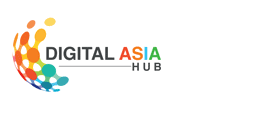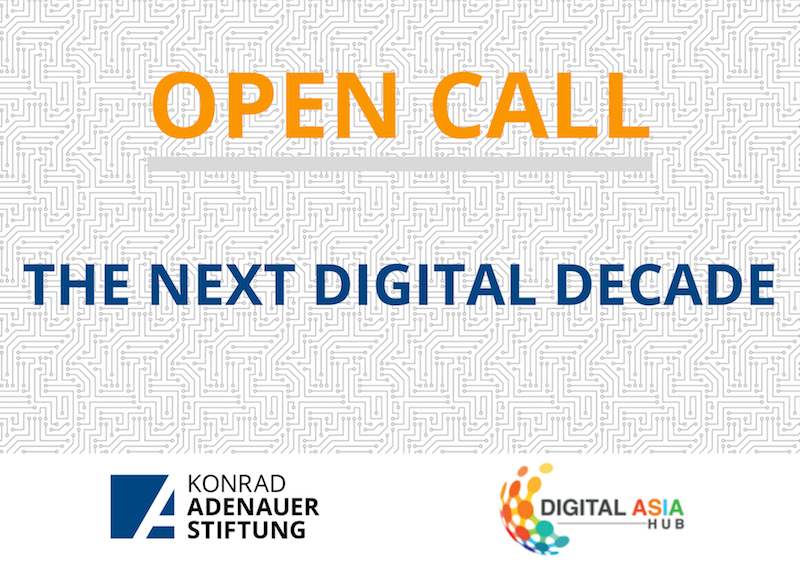Konrad Adenauer Stiftung and Digital Asia Hub invite scholars and practitioners at all stages of their career and from various disciplines to contribute lessons to inform policy.
ABOUT
The Internet has brought significant change to all sectors of society and digital technologies are regarded as a key driver for ensuring future prosperity. At the same time, personal liberties and societal cohesion are threatened while traditional institutions, government structures, companies, and media often struggle to adjust. Therefore, governing new media and new technologies will be key for the next decade and the policy frameworks will have to be built now.
We are looking for best practices and case studies in Asia showing how to manage digital transformation with smart policies that enable development, improved communication, access to information and education, new economic empowerment, and greater political participation, while at the same time reducing the negative effects of this transformation on social cohesion, privacy, and democratic principles.
AREAS OF INTEREST
Authors are invited to explore Asian approaches to topics such as :
1. Innovation
How can innovation flourish while also protecting users and citizens? How can we ensure that economies evolve in the age of globalisation and digitalisation to create value for everyone? What can foster innovation ecosystems and cooperation? How can we strengthen entrepreneurship, the funding landscape and the operationalization of excellent research? What does the future of work look like? What are best practices to prepare the workforce? What does this mean for the education system more generally (particularly digital literacy)? What can spur innovation in the health sector? What is the role of private internet companies and social media platforms, and what are mechanism to hold them accountable?
2. Media Platforms
How should new media and new technologies be governed? How can we ensure that facts are the foundations for decision making? What are different approaches from the region to regulate social media (especially political advertising and hate speech)? How should societies deal with the tendency towards polarization of discourse on social media? How should governments tackle business models that affect the right to privacy (for e.g. free services in exchange for massive data collection)?
3. Trust in Technology/Infrastructure
What will maintain or strengthen trust in technology? How can ethical AI be deployed, and who should be responsible for the development and enforcement of algorithmic fairness? How can the social sciences shape with the design of algorithms? How should audit mechanisms for algorithmic decision-making be articulated and scaled?
4. Social Cohesion
How can we address digital divides (including socio-economic, spatial, generational divides)? How can power imbalances be reduced, and what can guarantee equitable access to digital technologies? What does (digital) literacy mean and how can it be improved? What are novel and effective measures to counter hate speech and fake news?
5. Cybersecurity and Health
How can we protect healthcare infrastructure against cyberthreats, and how can liability be apportioned? What new approaches can balance the need for innovation with the protection of privacy in the field of e- health? What does it take to build secure and fair platforms for data sharing in the health sector?
6. GovTech and RegTech
What will strengthen the digitalization of the public sector? What are ways to foster a GovTech and/or RegTech Ecosystem and mindset? What does it take to build them? What can boost digital literacy within the public sector, and the political sphere?
INVITATION AND HONORARIUM
▪ We offer an honorarium of SGD 1300 for pieces selected for inclusion in an edited volume
▪ We will invite 8 authors to a conference in Berlin to present their case studies and best practices to German decision-makers (subject to applicable travel and health advisories)
▪ The selected contributions will be published and distributed through Digital Asia Hub and Konrad Adenauer Stiftung
EXTENDED TIMELINE
▪ Abstracts of 750 words (max) are due by 15 May 2020, 11:59pm (anywhere on earth)
▪ The review process will be fast-tracked
▪ Invitations to submit full papers, and an invitation to Berlin will be sent out by 5 June 2020
▪ First drafts should be submitted by 1 August 2020
▪ Final papers are due on 1 September 2020
▪ The conference in Germany will take place in Berlin on 9 & 10 November 2020
SUBMISSION GUIDELINE
▪ Length of abstract: 750 words
▪ Final pieces: 3,500 – 5,000 words (excluding footnotes and bibliography)
Please submit your abstracts by 15 May 2020 to Katharina Naumann. For enquiries too, please contact Katharina Naumann.

